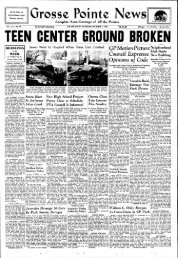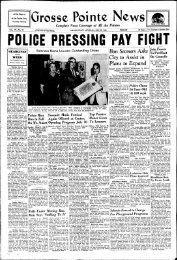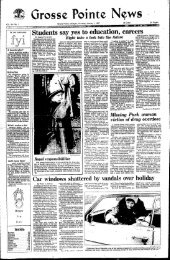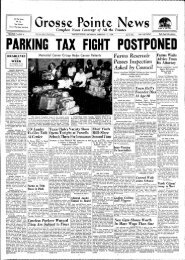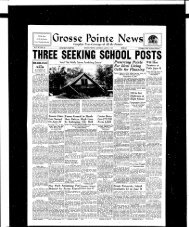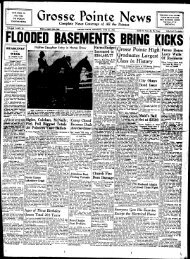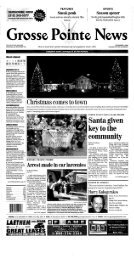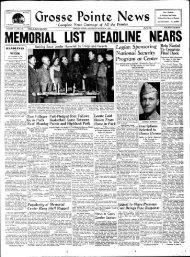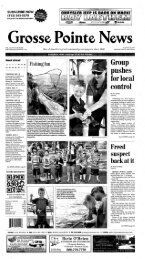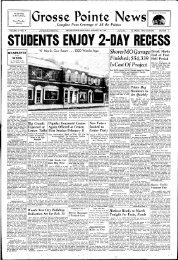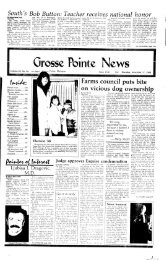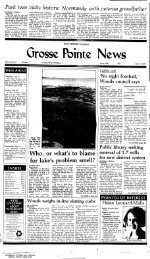grosse pointe - Local History Archives
grosse pointe - Local History Archives
grosse pointe - Local History Archives
You also want an ePaper? Increase the reach of your titles
YUMPU automatically turns print PDFs into web optimized ePapers that Google loves.
GROSSE POINTE NEWS, SEPTEMBER 10, 2009<br />
HEALTH<br />
ASK THE EXPERTS By Lori Egan Josephs<br />
Learn warning signs of drug use<br />
Q<br />
. As a parent of teenager,<br />
• what steps can I take to<br />
prevent them from wantingto<br />
start using alcohol and drugs?<br />
A The teen years are such<br />
xTL» an influential time of a<br />
person's life. Almost every kid<br />
will have to make a decision at<br />
some point on whether to try alcohol<br />
or drugs. When you look at<br />
the facts and trends still taking<br />
place with teenage drinking, you<br />
can not ignore this major health<br />
issue.<br />
According to the CDC, "Alcohol<br />
is the most commonly used and<br />
abused drug amongyouth in the<br />
United States, more than tobacco<br />
and illicit drugs. Although<br />
drinking by persons under the<br />
age of 21 is illegal, people aged<br />
12 to 20 years drink 11 percent of<br />
all alcohol consumed in the<br />
United States."<br />
when it comes to under age<br />
drinking, parents must be proactive,<br />
not reactive. Set the stage<br />
long before the children, will be in<br />
a position to say no to driiiking<br />
or drugs. Here are some thing to<br />
help children hi then* defense<br />
against drinking:<br />
1. Start the conversation about<br />
alcohol and drugs early—Do<br />
not wait until they are a teen.<br />
2. Be a healthy example—<br />
Children will look at your own<br />
behavior when it comes to drinking<br />
or attitude toward drinking.<br />
3. Educate them on the consequences<br />
of underage drinking—<br />
Don't just tell them they can not<br />
drink, back it up with facts, along<br />
with legal problems.<br />
4. Providethem with healthy<br />
alternatives to drinking—<br />
Sports, arts or any activity they<br />
love that will give them an outlet<br />
and make them fell good about<br />
themselves. Lack of self esteem<br />
plays a role in why children<br />
drink.<br />
5. Give them consistency—<br />
Children need and actually want<br />
structure, rules and discipline.<br />
6. Know your children's<br />
friends, as well as their parents<br />
—Teens who drink, drink with<br />
their friends. Make sure you<br />
know as much as you can about<br />
their friends and get to know<br />
their parents.<br />
7. Offer them a solid family<br />
foundation—Whatever y our<br />
family situation is, make your<br />
children fell safe and secure.<br />
8. Explain the disease of aleo-<br />
Save the date<br />
Theme: Are Your Kids at Risk? Teen<br />
Alcohol and Drug Trends<br />
Date: Tuesday, Sept. 29<br />
Time: 7 p.m.<br />
Admission: Free<br />
Location: Yeoman Hall, St. Michael's<br />
Epsicopal Church, 20475<br />
Sunningdale Park, Grosse Pointe<br />
Woods.<br />
For reservations: (313) 432-3832 or<br />
infq@familycenterweb.org<br />
holism — Let your children<br />
know the4 facts about alcoholism.<br />
Specially if it runs in the<br />
family, and what makes an alcoholic<br />
different from a normal<br />
drinker ker.<br />
Unfortunately, there is no 100<br />
percent way to guarantee your<br />
child will never have a drink or<br />
drug during their teenage years.<br />
But it has been proven that doing<br />
nothing is a bad strategy; taking<br />
action and being a strong force<br />
in your child's life will make a<br />
difference.<br />
there are many resources<br />
available today for parents and<br />
teenagers; giving answers and<br />
resources to their questions on<br />
underage drinking and drug use.<br />
As a parent you must set a good<br />
example for your own children.<br />
Do not assume that it is other<br />
people's problem or that your<br />
child is immune to the pressures<br />
of drinking.<br />
Bottom line—Be the parent<br />
and make the tough decisions for<br />
the well-being of your child. Be c<br />
consistent with your rules when<br />
it comes to underage drinking,<br />
and be a healthy role model.<br />
Lori Josephs is an expert on<br />
the disease of alcoholism. For<br />
her own experience as a recovering<br />
alcohol;s she hopes to<br />
teach children on how to make<br />
better choices. For more than<br />
12 years, she has been speaking<br />
on her experiences to audiences<br />
at treatment centers, private<br />
counseling groups and<br />
students. She has a Bachelor of<br />
Science in health care services<br />
and is the founder to "The<br />
Center for Successful Living."<br />
She is a certified relationship<br />
coach and a member of<br />
the speaker's bureau at<br />
Brighton Hospital. She serves<br />
as an alumni contact for The<br />
Betty Ford Center for<br />
Southeastern Michigan. For<br />
more information, call her at<br />
(248) 529-3375 or e-mail her at<br />
info@thecenter forsuccessfulliving.com<br />
or visit thecenterforsuccessfullliving.<br />
com.<br />
Hospital hosts teen volunteers' 60th birthdays<br />
One hot July evening, two<br />
"Guild Girls," as the teen volunteers<br />
were known 45 years<br />
ago, were asked to wash dishes*<br />
when the Bon Secours<br />
Hospital dishwasher broke<br />
down.<br />
The girls, who had never<br />
met, sweated and grumbled<br />
their way through piles of<br />
dirty dishes. The result, besides<br />
clean dishes, is a friendship<br />
that has lasted to this<br />
very day.<br />
Pam Stanley and Kathy<br />
Newman, both of Grosse<br />
Pointe Woods went on to<br />
work as "ward clerks" at the<br />
hospital. Stanley worked on<br />
what was known as "St.<br />
Mary's" hall while Newman<br />
worked on "St. Joe's" hall.<br />
Their friendship continued<br />
through high school and college.<br />
Stanley became a licensed<br />
practical nurse and continued<br />
to work at the hospital. She<br />
married Mike Stanley, who<br />
was an orderly on the same<br />
nursing unit.<br />
Newman graduated from<br />
Wayne State University as a<br />
registered nurse and became<br />
a nurse practitioner.<br />
The friends decided to not<br />
only celebrate their 60th<br />
birthdays together, but to celebrate<br />
the milestone the entire<br />
year. Each took turns surprising<br />
the other with birthday<br />
adventures.<br />
To relive the night they met,<br />
Stanley decided it would be<br />
fun to return to the hospital<br />
for lunch in the cafeteria.<br />
Stanley contacted<br />
Geraldine Day, a nurse at<br />
Beaumont to set the wheels in<br />
motion.<br />
To the surprise of Stanley<br />
and Newman, Day arranged<br />
for the two to be treated to a<br />
special lunch. A cloth-dressed<br />
table was reserved for them<br />
by the window overlooking<br />
the flower garden and water<br />
fountain. The table was set<br />
with china, roses and balloons.<br />
The women dined on a<br />
meal prepared especially for<br />
them and were served<br />
dessert.<br />
Hospital chef Dan Kellogg's<br />
invitation to wash dishes was<br />
declined.<br />
SENIOR SCENE By Ruth Cam<br />
Aids to vision for longer driving<br />
Friends for 45 years, Pam Stanley and Kathy Neuman.<br />
Si9{pE 1980<br />
• Providing 24 hour care<br />
• RN's, LPN's Nurses Aides<br />
• Experienced, bonded,<br />
and insured<br />
• Transportation, Errands,<br />
Housekeeping<br />
•NURS1N<br />
(586) 285-0300<br />
www.nursingunlimitedonline.com<br />
It could be<br />
the most<br />
important<br />
picture of<br />
your life,<br />
When Quality Counts*,<br />
Count On The Best!<br />
MRI Appointments within 24 hours<br />
Reports faxed immediately to your physician<br />
Accredited by The American College of Radiology.<br />
Affiliated with St. John Hospital and Medical Center,<br />
St. John Macomb/Oakland Hospital, Henry Ford Macomb Hospital<br />
Two Locations to Serve You<br />
WAYNE-MACOMB MM<br />
18245 Ten xVIile Road Ste 100<br />
Roseville, 2VH 48066<br />
MACOMB MRI<br />
42700 SchoeaJierr Rd<br />
Sterling Heights, MI 48313<br />
Visit www,waynejmcombmri.com<br />
My friend, Carolyn<br />
Barth, sent me<br />
the brochure<br />
"The Eye and<br />
The Auto," sponsored<br />
by the Detroit Institute of<br />
Ophthalmology that persuaded<br />
me to seek more information.<br />
My own vision problems<br />
and those of some readers present<br />
a concern about future<br />
loss of a driver's license.<br />
That's why I talked to Dr.<br />
Philip Hessburg, DIO president,<br />
who said this was the<br />
fifth International Conference<br />
on the Relationship Between<br />
Vision and the Safe Operation<br />
of a Motorized Vehicle the DIO<br />
has sponsored.<br />
"We first got started at the<br />
institute on the subject of vision<br />
and driving because I<br />
knew that many with minimally<br />
impaired vision who have<br />
lost their driver licenses could<br />
have continued to drive safely<br />
given results of the research<br />
already conducted around the<br />
world," Hessburg said.<br />
"Instead we let the visual<br />
acuity standards, used in every<br />
state, which have no relationships<br />
with driving performance<br />
or accident statistics,<br />
deny driver licenses to many<br />
people. Loss of a driver's permit<br />
results in loss of independence,<br />
increased depression,<br />
associated medical, societal,<br />
economic and psychological<br />
problems and significant costs<br />
for real or imagined ills related<br />
to the depression.<br />
"There's still another major<br />
problem. The need for all of<br />
us, especially national media,<br />
to address the tremendous<br />
number of highway deaths<br />
each year. But the big problems<br />
here are not related to elder<br />
citizens with minimal visual<br />
concerns, they relate more<br />
often to young males, usually<br />
with perfect vision, who are<br />
driving with alcohol impaired<br />
judgment.<br />
"A plane crash several years<br />
ago that killed 110 people<br />
drew great media coverage.<br />
Yet every day 117 people in<br />
this country die on the high-<br />
YOUR<br />
NEIGHBORHOOD<br />
FULL SERVICE<br />
PHARMACY<br />
"Serving the Grosse Pointes since 1945'<br />
www.beacon<strong>pointe</strong>pharmacy.com<br />
• Custom Compound Experts<br />
• 100% Natural Vitamins • Flu Shots Available<br />
• Most Insurances Accepted<br />
We Accept Electronic New Prescriptions & Refills<br />
NEW Mini Clinic for Health Screenings<br />
FREE DELIVERY • FREE GLUCOMETER<br />
Hours: Mon-Fri 9-6 • Sat 9-3<br />
PHARMACY<br />
inte<br />
Toll Free: 1 (800) 962-3450<br />
ways with little media attention.<br />
"Since the dawn of the auto<br />
age, we have lost 650,000 people<br />
in all our wars, but more<br />
than 3 million have died in<br />
highway deaths. The 14<br />
teenagers killed in the<br />
Columbine High School massacre<br />
rightfully fueled the media<br />
for weeks. But the media<br />
almost totally ignored the 18<br />
teenagers who daily lose their<br />
lives on our roads," he said.<br />
In 2000, the U.S.<br />
Department of Transportation<br />
calculated such losses at $231<br />
billion per year.<br />
That is why The Eye and<br />
The Auto, the only one of its<br />
kind in the nation, is so important.<br />
"What our conferences do is<br />
bring together experts in the<br />
various fields from our country<br />
and all over the world who<br />
serve as faculty for the professionals<br />
who attend the conferences,"<br />
Hessburg said. "They<br />
come from the fields of driver<br />
safety and performance, and<br />
include scientists, physicians,<br />
engineers, clinicians, designers<br />
and policy specialists."<br />
When I asked Hessburg how<br />
the conferences had changed<br />
over the years, he said that the<br />
scientific world has come to realize<br />
what an important role<br />
that the brain, in addition to<br />
the eye, plays in determining<br />
how people drive. Research is<br />
giving us many insights into<br />
the relationship, he added.<br />
"Perhaps many years ago<br />
we should have called this<br />
congress 'The Eye, The Brain<br />
and The Auto,'" Hessburg said.<br />
The major cause of accidents<br />
is drunk driving. The<br />
technology exists for a sensor<br />
to note alcoholic fumes and<br />
lock the ignition. Frequent<br />
deaths result fromnot using a<br />
seat belt.<br />
Education seems to have<br />
helped much with this problem,<br />
though drunk and distracted<br />
drivers remain tremendous<br />
problems. Hessburg said<br />
technology could save lives,<br />
even to the point where autonomous<br />
vehicle systems are<br />
used.<br />
Who hasn't escaped near accidents<br />
when changing lanes<br />
only to discover that another<br />
vehicle hides in the car's blind<br />
spot? Lane departure technology<br />
already exists to help<br />
make this a mistake of the<br />
past.<br />
Other technology includes<br />
adaptive cruise control stop<br />
tailgating. There's also backup/parking<br />
assist, night vision,<br />
adaptive frontlighting, rear<br />
impact counter measures.<br />
Some are standard equipment<br />
in various high end models.<br />
There is some belief advanced<br />
lighting technologies,<br />
such as LED, in the aggregate<br />
may be the least costly way to<br />
reduce the highway death<br />
rates.<br />
"Even though 90 percent of<br />
the information necessary to<br />
drive is gathered visually, we<br />
still don't know for sure what<br />
tests accurately tell us whether<br />
the driver's vision and his cognitive<br />
capacity is adequate,"<br />
Hessburg said. "But we're sure<br />
the visual acuity standards<br />
along aren't adequate. One<br />
new test under discussion<br />
combines vision with levels of<br />
sensory or cognitive performance<br />
and is called, the<br />
'Useful Field of View' test."<br />
Decades of research has attempted<br />
to put substances to<br />
the relationship between vision<br />
and the safe operation of<br />
a motorized vehicle.<br />
"It's not a simple task," he<br />
said. "Driving may be more<br />
cerebral than retinal. It is<br />
clearly more cognitive than<br />
perceptual."<br />
The three-day conference is<br />
Sept. 16 -18 at the Research<br />
Laboratory at General Motors<br />
Technical Center in Warren.<br />
One day attendance costs<br />
$150; three days cost $350.<br />
For more information, call<br />
(313) 824-4710 orvisit<br />
eyeson.org.<br />
"We'd really like more people<br />
to know the important research<br />
taking place today. As<br />
an IRS 501 (c) (3), we cannot<br />
lobby government officials for<br />
changes in the law relative to<br />
motor licensure visual standards.<br />
But individuals who<br />
have an important stake in this<br />
research, and that includes all<br />
who drive, could help persuade<br />
their elected officials to<br />
fund research and the eventual<br />
implementation of that research<br />
in our automobiles and<br />
on our highways," Hessburg<br />
said.<br />
Cain may be reached at ruth<br />
cain@comcast.net



